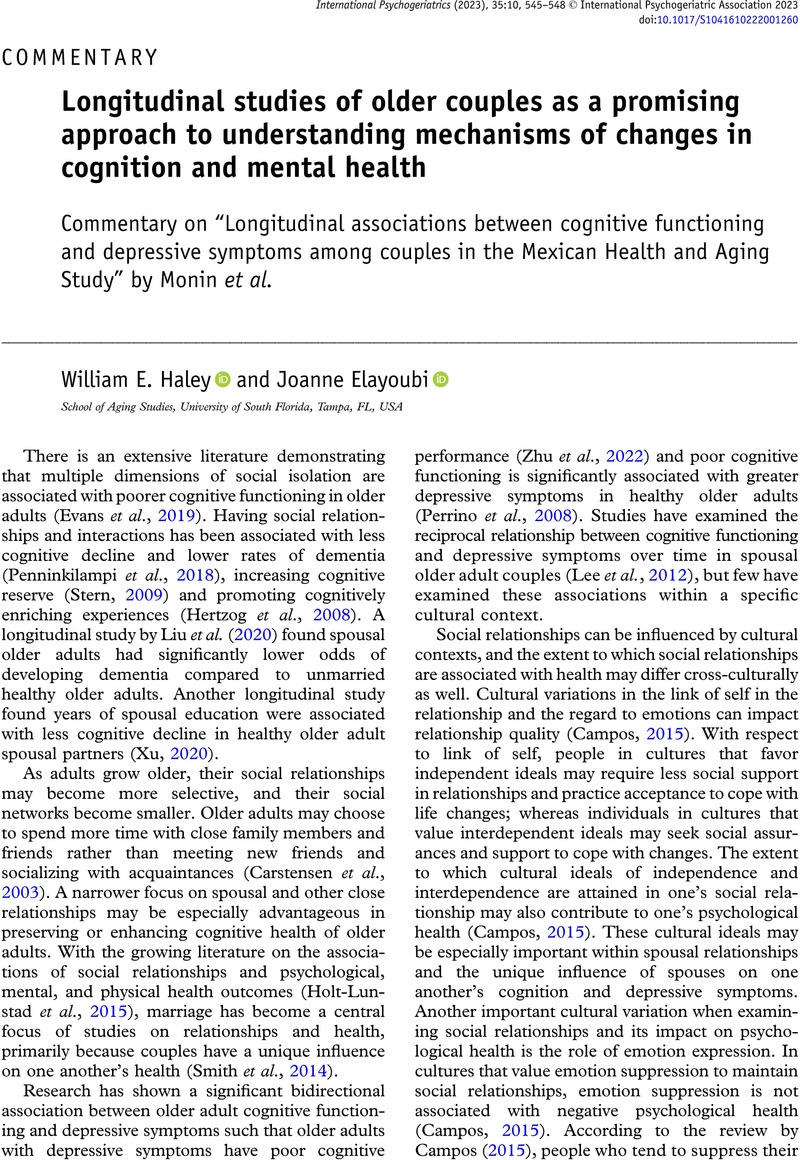No CrossRef data available.
Article contents
Longitudinal studies of older couples as a promising approach to understanding mechanisms of changes in cognition and mental health
Commentary on “Longitudinal associations between cognitive functioning and depressive symptoms among couples in the Mexican Health and Aging Study” by Monin et al.
Published online by Cambridge University Press: 06 January 2023
Abstract
An abstract is not available for this content so a preview has been provided. Please use the Get access link above for information on how to access this content.

Information
- Type
- Commentary
- Information
- International Psychogeriatrics , Volume 35 , Special Issue 10: Issue Theme: Aging and Well-Being , October 2023 , pp. 545 - 548
- Copyright
- © International Psychogeriatric Association 2023
References
Campos, B. (2015). What is the role of culture in the association of relationships with health? Social and Personality Psychology Compass, 9, 661–677. https://doi.org/10.1111/spc3.12226
CrossRefGoogle Scholar
Cano-López, I. et al. (2021). Educational level as a protective factor against the influence of depressive symptoms on cognition in older adults: implications for functional independence during a 10-year follow-up. International Psychogeriatrics, 33, 813–825. https://doi.org/10.1017/S1041610221000272
CrossRefGoogle ScholarPubMed
Carstensen, L. L., Fung, H. H. and Charles, S. T. (2003). Socioemotional selectivity theory and the regulation of emotion in the second half of life. Motivation and Emotion, 27, 103–123. https://doi.org/10.1023/A:1024569803230
CrossRefGoogle Scholar
Evans, I. E., Martyr, A., Collins, R., Brayne, C. and Clare, L. (2019). Social isolation and cognitive function in later life: a systematic review and meta-analysis. Journal of Alzheimer’s Disease, 70, S119–S144. https://doi.org/10.3233/JAD-180501
CrossRefGoogle ScholarPubMed
Fung, H. H., Stoeber, F. S., Yeung, D. Y. L. and Lang, F. R. (2008). Cultural specificity of socioemotional selectivity: age differences in social network composition among Germans and Hong Kong Chinese. The Journals of Gerontology Series B: Psychological Sciences and Social Sciences, 63, P156–P164. https://doi.org/10.1093/geronb/63.3.P156
CrossRefGoogle ScholarPubMed
Hertzog, C., Kramer, A. F., Wilson, R. S. and Lindenberger, U. (2008). Enrichment affects adult cognitive development: can the functional capacity of older adults be preserved and enhanced? Psychological Science in the Public Interest, 9, 1–65. https://doi.org/10.1111/j.1539-6053.2009.01034.x
CrossRefGoogle Scholar
Holt-Lunstad, J., Smith, T. B., Baker, M., Harris, T. and Stephenson, D. (2015). Loneliness and social isolation as risk factors for mortality: a meta-analytic review. Perspectives on Psychological Science, 10, 227–237. https://doi.org/10.1177/1745691614568352
CrossRefGoogle ScholarPubMed
Lee, J., Paddock, S. M. and Feeney, K. (2012). Emotional distress and cognitive functioning of older couples: a dyadic analysis. Journal of Aging and Health, 24, 113–140. https://doi.org/10.1177/0898264311423703
CrossRefGoogle ScholarPubMed
Liu, H., Zhang, Z., Choi, S. W. and Langa, K. M. (2020). Marital status and dementia: evidence from the Health and Retirement Study. The Journals of Gerontology, Series B: Psychological Sciences and Social Sciences, 75, 1783–1795. https://doi.org/10.1093/geronb/gbz087
CrossRefGoogle ScholarPubMed
Liu, H., Zhang, Z. and Zhang, Y. (2021). A national longitudinal study of marital quality and cognitive decline among older men and women. Social Science & Medicine, 282, 114151. https://doi.org/10.1016/j.socscimed.2021.114151
CrossRefGoogle ScholarPubMed
Monin, J. K. et al. (2018). Longitudinal associations between cognitive functioning and depressive symptoms among older adult spouses in the Cardiovascular Health Study. The American Journal of Geriatric Psychiatry, 26, 1036–1046. https://doi.org/10.1016/j.jagp.2018.06.010
CrossRefGoogle ScholarPubMed
Monin, J., McAvay, G., Newkirk, K. and Samper-Ternent, R. (in press). Longitudinal associations between cognitive functioning and depressive symptoms among couples in the Mexican Health and Aging Study. International Pyschogeriatrics. To be published.Google Scholar
Penninkilampi, R., Casey, A. N., Singh, M. F. and Brodaty, H. (2018). The association between social engagement, loneliness, and risk of dementia: a systematic review and meta-analysis. Journal of Alzheimer’s Disease, 66, 1619–1633. https://doi.org/10.3233/JAD-180439
CrossRefGoogle ScholarPubMed
Perrino, T., Mason, C. A., Brown, S. C., Spokane, A. and Szapocznik, J. (2008). Longitudinal relationships between cognitive functioning and depressive symptoms among hispanic older adults. The Journals of Gerontology: Series B, 63, 309–317. https://doi.org/10.1093/geronb/63.5.P309
CrossRefGoogle ScholarPubMed
Reppermund, S. (2021). The interplay between depressive symptoms, cognitive function, activities of daily living and cognitive reserve in older adults. International Psychogeriatrics, 33, 759–761. https://doi.org/10.1017/S1041610221000508
CrossRefGoogle ScholarPubMed
Smith, T. W., Baron, C. E. and Caska, C. M. (2014). On marriage and the heart: Models, methods, and mechanisms in the study of close relationships and cardiovascular disease. In: Agnew, C. and South, S. (Eds.), Interpersonal Relationships and Health: Social and Clinical Psychological Mechanisms (pp 34–70). New York: Oxford University Press. https://doi.org/10.1093/acprof:oso/9780199936632.003.0003
CrossRefGoogle Scholar
Stern, Y. (2009). Cognitive reserve. Neuropsychologia, 47, 2015–2028. https://doi.org/10.1016/j.neuropsychologia.2009.03.004
CrossRefGoogle ScholarPubMed
Xu, M. (2020). Spousal education and cognitive functioning in later life. The Journals of Gerontology, Series B: Psychological Sciences and Social Sciences, 75, 141–150. https://doi.org/10.1093/geronb/gbz01
CrossRefGoogle ScholarPubMed
Zhu, Y., Li, C., Xie, W., Zhong, B., Wu, Y. and Blumenthal, J. A. (2022). Trajectories of depressive symptoms and subsequent cognitive decline in older adults: a pooled analysis of two longitudinal cohorts. Age and Ageing, 51, afab191. https://doi.org/10.1093/ageing/afab191
CrossRefGoogle ScholarPubMed

